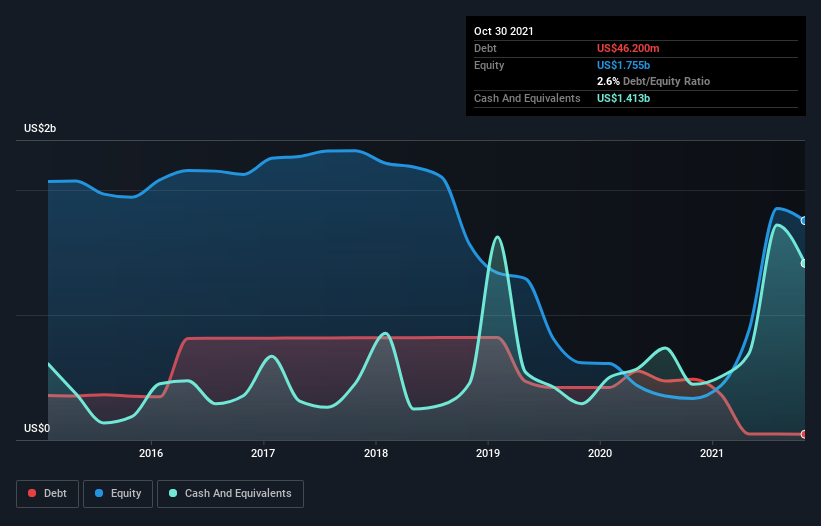- United States
- /
- Specialty Stores
- /
- NYSE:GME
GameStop (NYSE:GME) Has Debt But No Earnings; Should You Worry?

Some say volatility, rather than debt, is the best way to think about risk as an investor, but Warren Buffett famously said that 'Volatility is far from synonymous with risk.' It's only natural to consider a company's balance sheet when you examine how risky it is, since debt is often involved when a business collapses. We can see that GameStop Corp. (NYSE:GME) does use debt in its business. But the more important question is: how much risk is that debt creating?
When Is Debt A Problem?
Generally speaking, debt only becomes a real problem when a company can't easily pay it off, either by raising capital or with its own cash flow. In the worst case scenario, a company can go bankrupt if it cannot pay its creditors. While that is not too common, we often do see indebted companies permanently diluting shareholders because lenders force them to raise capital at a distressed price. Of course, plenty of companies use debt to fund growth, without any negative consequences. When we examine debt levels, we first consider both cash and debt levels, together.
See our latest analysis for GameStop
How Much Debt Does GameStop Carry?
The image below, which you can click on for greater detail, shows that GameStop had debt of US$46.2m at the end of October 2021, a reduction from US$485.5m over a year. However, its balance sheet shows it holds US$1.41b in cash, so it actually has US$1.37b net cash.

How Healthy Is GameStop's Balance Sheet?
We can see from the most recent balance sheet that GameStop had liabilities of US$1.53b falling due within a year, and liabilities of US$473.8m due beyond that. Offsetting this, it had US$1.41b in cash and US$241.2m in receivables that were due within 12 months. So its liabilities total US$352.9m more than the combination of its cash and short-term receivables.
Given GameStop has a humongous market capitalization of US$11.3b, it's hard to believe these liabilities pose much threat. However, we do think it is worth keeping an eye on its balance sheet strength, as it may change over time. While it does have liabilities worth noting, GameStop also has more cash than debt, so we're pretty confident it can manage its debt safely. When analysing debt levels, the balance sheet is the obvious place to start. But it is future earnings, more than anything, that will determine GameStop's ability to maintain a healthy balance sheet going forward. So if you want to see what the professionals think, you might find this free report on analyst profit forecasts to be interesting.
Over 12 months, GameStop reported revenue of US$5.9b, which is a gain of 14%, although it did not report any earnings before interest and tax. That rate of growth is a bit slow for our taste, but it takes all types to make a world.
So How Risky Is GameStop?
We have no doubt that loss making companies are, in general, riskier than profitable ones. And we do note that GameStop had an earnings before interest and tax (EBIT) loss, over the last year. And over the same period it saw negative free cash outflow of US$227m and booked a US$154m accounting loss. With only US$1.37b on the balance sheet, it would appear that its going to need to raise capital again soon. Overall, we'd say the stock is a bit risky, and we're usually very cautious until we see positive free cash flow. There's no doubt that we learn most about debt from the balance sheet. However, not all investment risk resides within the balance sheet - far from it. For instance, we've identified 3 warning signs for GameStop that you should be aware of.
If, after all that, you're more interested in a fast growing company with a rock-solid balance sheet, then check out our list of net cash growth stocks without delay.
New: Manage All Your Stock Portfolios in One Place
We've created the ultimate portfolio companion for stock investors, and it's free.
• Connect an unlimited number of Portfolios and see your total in one currency
• Be alerted to new Warning Signs or Risks via email or mobile
• Track the Fair Value of your stocks
Have feedback on this article? Concerned about the content? Get in touch with us directly. Alternatively, email editorial-team (at) simplywallst.com.
This article by Simply Wall St is general in nature. We provide commentary based on historical data and analyst forecasts only using an unbiased methodology and our articles are not intended to be financial advice. It does not constitute a recommendation to buy or sell any stock, and does not take account of your objectives, or your financial situation. We aim to bring you long-term focused analysis driven by fundamental data. Note that our analysis may not factor in the latest price-sensitive company announcements or qualitative material. Simply Wall St has no position in any stocks mentioned.
About NYSE:GME
GameStop
A specialty retailer, provides games and entertainment products through its stores and e-commerce platforms in the United States, Canada, Australia, and Europe.
Flawless balance sheet with solid track record.
Similar Companies
Market Insights
Community Narratives


